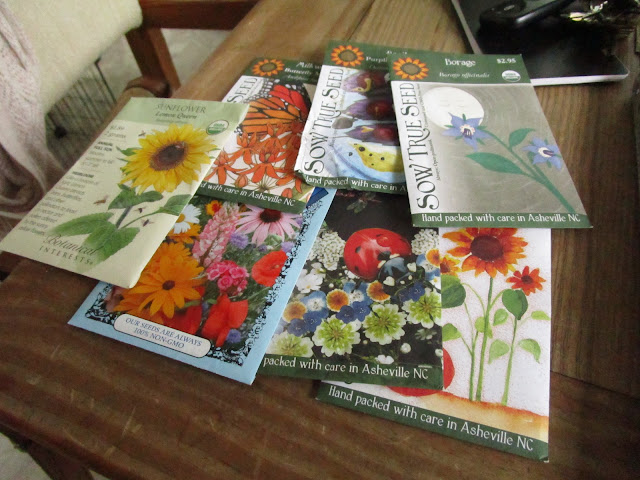Reaping What You Sow Part Two: What does it all mean?
It seems that Jack Frost is not finished with us yet here in Eastern North Carolina. That only makes me look forward to spring more.
So, since there is no work that can be done, I think that means it's time to jump into my second post on reaping what you sow:
I think these are enough terms to get us started on understanding what those seed packets and seedling labels mean. Be on the lookout for the next post in this series - Reading a Seed Packet - where we apply what we've learned here as well as a little bit more.
For more on Reaping What You Sow
Part 1: Seed and Plant Selection
Part 3: Reading a Seed Packet
Part 4: ????
Hope you are having a good week and staying warm!
What do you do when you can't get out in the garden?
What hobbies keep you busy year around?
Take care,
Rebecca
Sources: Sow True Seed Catalog, my mom, and the Internet.
 |
| Not so frosty morn' |
What does it all mean?
First of all, like part of any lesson, we are going to talk some vocabulary - key terms if you will - that will help you be successful as you are looking at seeds. Most of these terms also apply to seedlings / transplants so you'll find this helpful no matter what.
| Very Buzzy Buzz Word |
GMO and Non-GMO or No GMO's
Going to start with a buzz word. GMO means genetically modified organism. In this case it means that the genes of one plant have been implanted with the genes of another organism. These genes could come from a virus, bacteria, animal, or another plant - it just depends. The idea behind this is that they take genes that scientist believe will help the plant be resistant to disease, grow better, or otherwise improve it.
No GMO or non-gmo, therefore, means that this particular plant does not have any modification done to its genetic structure except through traditional plant breeding.
The verdict is still out on the long term effects of GMO foods although there is some data to suggest it might no be so wise. I always like to buy a product or take a medicine knowing it's been around for a while and is considered safe. In that same strain of caution I try not to buy GMO products.
Open pollinated
This refers to how the seed was produced. This means that plants of a similar type were allowed to mix their pollen in a natural setting. Further, if seeds from that plant are collected to be reused they will grow true to the original plants. This is really important to more advanced gardeners who know how to save seeds and want seeds from a particular type. These are basically the opposite of hybrids.
Hybrid
Hybrid seeds are created by cross pollinating similar yet different plants with the idea of getting the best characteristics of each - for example disease resistance and exceptional flavor. This process is done in a natural way with no genetic modification When it comes to seed saving, the seeds from a hybrid plant are not guaranteed to grow true to type. This can be an issue - but not a big one for a beginner or small time gardener.Heirloom
Kind of like hybrid, heirloom seeds are those that have been passed down after many generations and were saved because those plants had exceptional characteristics that growers needed. Seeds from these plants will be true to type. Arguably heirloom seeds, especially those that are from your own family, are pretty cool.
Organic
Another buzzword here. Like the meats and vegetables, organic simply means that the product was produced without pesticides and artificial products. A lot of seeds are really good even if they are not organic but to be organic seeds must meet a rigorous set of standards by the USDA. Typically this means seeds won't be treated but not always.
Treated v. Untreated
Treated seeds are those to which fungicides, fertilizers, insecticides, or other chemicals have been applied. If you've ever had the chance to read Silent Spring then you know that many of these chemicals are not all that good for the environment or for people. However, some treatments are safer than others so it is wise to be a smart consumer.
Annual v. Perennial
Annual seeds are those which must be planted new every year. Perennial seeds are those which can be planted once and will live for quite some time. Some annual plants, in the right conditions and climates, will live for a long time and vice versa for perennials. Some annuals create their own seeds every year and can re-establish themselves - (example: the vincas at my house).I think these are enough terms to get us started on understanding what those seed packets and seedling labels mean. Be on the lookout for the next post in this series - Reading a Seed Packet - where we apply what we've learned here as well as a little bit more.
For more on Reaping What You Sow
Part 1: Seed and Plant Selection
Part 3: Reading a Seed Packet
Part 4: ????
What do you do when you can't get out in the garden?
What hobbies keep you busy year around?
Take care,
Rebecca
Sources: Sow True Seed Catalog, my mom, and the Internet.


Pleasant day!
ReplyDeleteImages Animated Gif
Ironically, I get a spam comment from Images Animated Gifs on one of the only posts I have without pictures. lol.
Delete